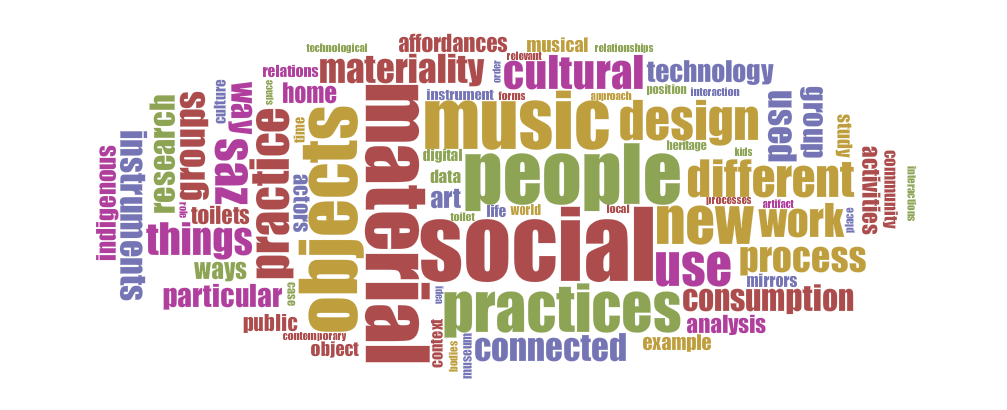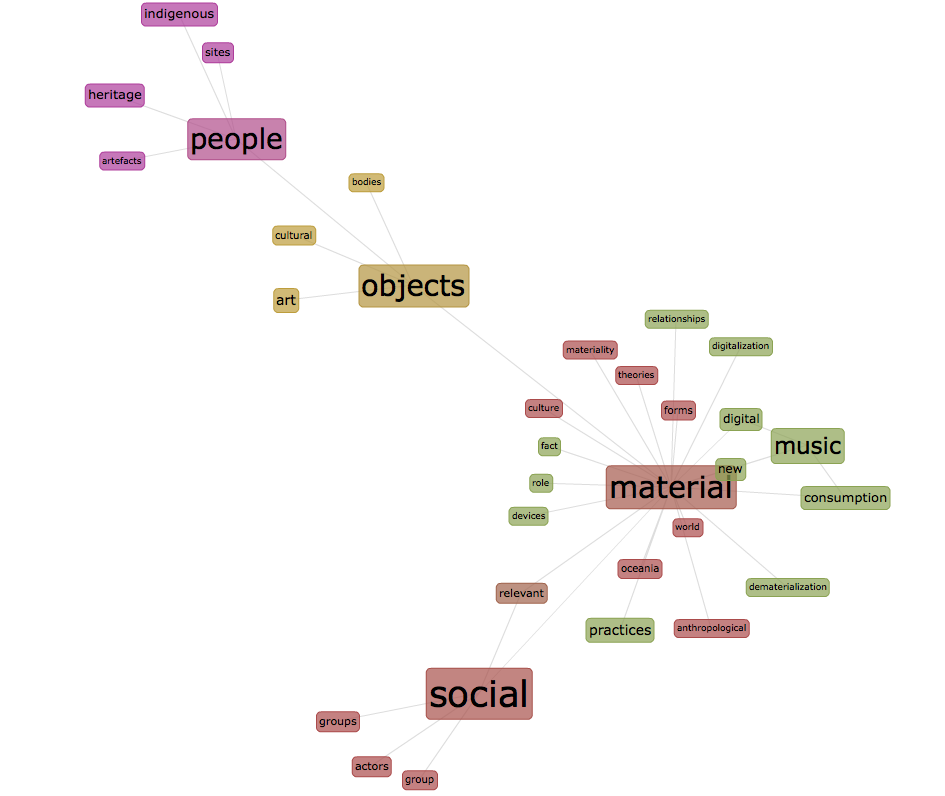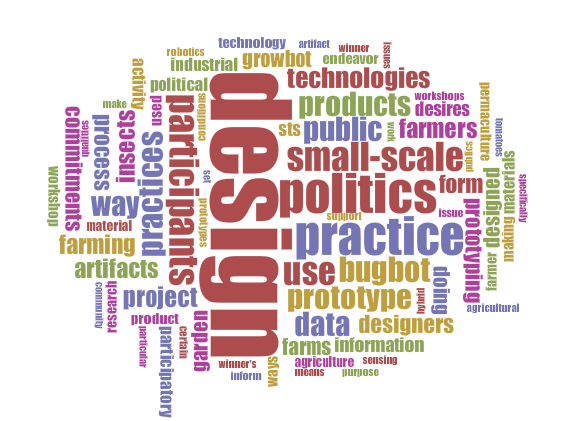SOCI/ANTH 441/2A – Material Culture
Week 1: September 3, 2014
Alex Enkerli alex@ethnographer.ca
Course Outline
SOCI/ANTH 441 – Material Culture – Course Outline (PDF)
Today
- Getting acquainted
- Discuss project
- Discuss work with texts
Next Week
Meeting in the Library
- Meeting in LB 203
- Before class: create account on Zotero or RefWorks
- Core text: DiSalvo
- Complementary Text
Getting to Know Each Other
Classroom Activity: Our Favourite Things
(You have/had to be there…)
Alex
- Ethnographic disciplines
- Collaborative learning
- Informality
- Less oriented toward material culture
This Seminar
- History of the course
- Cross-listed and interdisciplinary
- Project-based
- Upper-level
- Deeper work with texts
Material Culture
- Nonhuman objects with humans
- Things, artefacts, stuff, matter, space
- Physical, concrete, tangible
- Diverse approaches
- Includes technology
Project
Doing anthropology and/or sociology with a thing
Three parts
- Description of a Thing
- Presentation
- Final Paper
Actual object, thing, site, material
- Tangible, concrete, physical
- Nonhuman
- As specific as possible (not generic): specimen, item, place
- May be mundane, everyday, obvious
- Can repeat
- Can be an object you create
Start with object
- Approach will come later
- Can mix approaches and object
- Obvious pairings: elevators and stratification, exercise
equipment and group membership
Part I: Description (October 8)
- Physical characteristics
- Sensory dimensions
- Genealogy
- Biography
- Lifecycle
- Not encyclopedic
Part II: “Show & Tell” (November 5–26)
- Share with the class or with small group
- Well-informed
- Connected with the course
- From “Work in Progress” to Deep Analysis
- Giving and getting feedback
Part III: Report (December 5)
- Bring together
- Case studies
- Anthropological and/or sociological insight
- Can be ethnographic (fieldwork, interviews…)
- Can create object with others
- Can be creative or artistic
- Can be experimental
Working with Texts
Core Texts
- All online (links to PDF files, available on-campus)
- Diverse
- Work in depth with each
Complementary Texts
- Post “One-Liner” (sentence or two) in forum
- Cited, related, citing
- Angle, perspective, approach
- Suggestions
- Reserved books
Core Texts WordCloud

(Blogpost)
Core Terms

List of Core Texts
- DiSalvo: design (80), politics (33), practice (30), participants
(22), small-scale (20). - Magaudda: music (156), practice (75), practices (78), consumption (70), digital (61).
- Bates: saz (136), instruments (105), instrument (69), turkish (33), musical (39).
- Griswold: art (78), objects (67), museum (37), position (36), exhibition (30).
- Pickering: toilets (83), toilet (67), composting (31), state (31), water (29).
- Prell: connected (82), kids (62), technology (55), teri (49), jim (47).
- Van Osch: affordances (74), application (49), group (48), groups (48), generativity (39).
- Vilar Rosales: home (69), domestic (35), migration (32), contemporary (25), things (30).
- Ylimaunu: mirrors (74), street (55), towns (39), gossip (38), century (37).
- Geismar: things (74), materialisation (32), material (50), social (49), oceania (23).
- Greer: indigenous (70), heritage (66), archaeological (45), people (52), sites (37).
Course Logistics
- Seminar format
- Attendance essential
- Contributions
- Come prepared: core and complementary texts before class
- “Prewrite”
Next Week
- Core text: DiSalvo, Carl. “Critical Making as Materializing the Politics of Design.” The Information Society 30, no. 2 (March 2014): 96–105.
- Before class: create RefWorks or Zotero account
- Complementary Text
- Library session: meeting in LB 203
DiSalvo and “Makers”
- Short text
- Digital fabrication (FabLabs, Hackerspaces, Makerspaces…)
- Design, technology, production
- Prosumption
- Collaboration, participation
- Artefacts and their Politics
DiSalvo WordCloud

DiSalvo Terms
participants, design, politics, small-scale, prototype, bugbot,
products, technologies, project, artifacts, insects, farming, farmers,
prototyping, designers, growbot, garden, farms, designed, commitments,
political, participatory, sts, industrial, materials, workshop,
technology, product, permaculture, making, farmer, agriculture,
prototypes, robotics, winner’s, artifact, community, agricultural,
winner, tomatoes, sensing, publics, flags, crops, enforce, bridges,
technological, automation, robot, reimagining, pesticides, objects,
object, latour, insect, harvester, dialogic, collaborative, cardboard,
automated, working, tomato, small-business, racist, politicized,
langdon, devices, ecological, conversation, critical, control,
decisions, decision, beaches, doctrine, agency, ag-tech, workers, wire,
trap, toys, things, sustainable, space, small, scrap, robust, robots,
rows, ratto, projects, producing, problematic, plants, plant,
pheromones, participating, participate, owners, materialities,
electronic
Complementary Texts
- Winner, Langdon “Do Artifacts Have Politics?” Daedalus Vol.
109, No. 1, Modern Technology: Problem or Opportunity? (Winter,
1980), pp. 121–136. - Ritzer, G., and N. Jurgenson. “Production, Consumption,
Prosumption: The Nature of Capitalism in the Age of the Digital
‘Prosumer.’” Journal of Consumer Culture 10, no. 1 (March 09,
2010): 13–36. doi:10.1177/1469540509354673. - Ratto, Matt. “Critical Making: Conceptual and Material Studies in
Technology and Social Life.” The Information Society 27, no. 4
(August 20, 2011): 252–60. doi:10.1080/01972243.2011.583819. - Hielscher, Sabine, and Adrian Smith. Community-Based Digital
Fabrication Workshops: A Review of the Research Literature. SPRU
Working Paper Series. SPRU – Science and Technology Policy Research,
University of Sussex, 2014. - Smith, Adrian, Sabine Hielscher, Sascha Dickel, Johan Söderberg, and
Ellen van Oost. Grassroots Digital Fabrication and Makerspaces:
Reconfiguring, Relocating and Recalibrating Innovation? SPRU
Working Paper Series. SPRU – Science and Technology Policy Research,
University of Sussex, 2013.
Reminder
Meeting in the Library
- Meeting in LB 203
- Before class: create account on Zotero or RefWorks
- Core text: DiSalvo
- Sentence or two about a complementary text